analysis East Asia
Why did China abstain from UN vote on Ukraine war even while US backs Russia?
Analysts say China's vote has to be seen in the context of a changing world order, where Donald Trump is upending America’s long-held role as a leading global player.
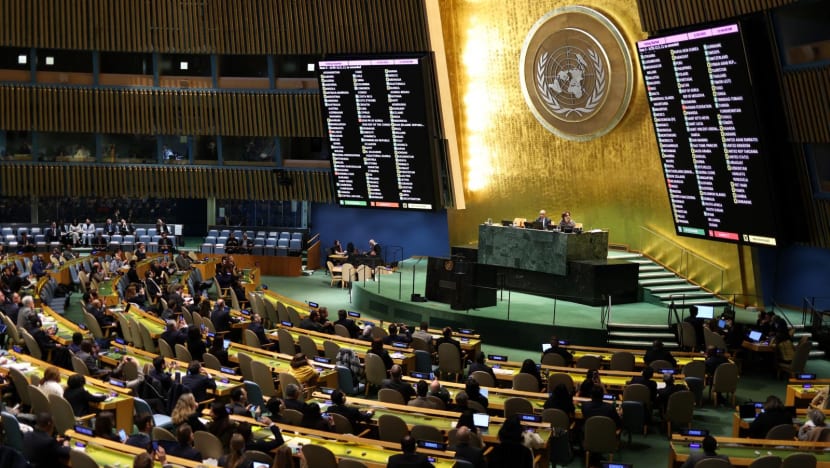
Ambassadors vote on a resolution to reaffirm Ukraine's territorial integrity during a United Nations General Assembly meeting on the third anniversary of Russia's invasion of Ukraine, at the UN headquarters in New York City on Feb 24, 2025. (Photo: AFP/Charly Triballeau)

This audio is generated by an AI tool.
SINGAPORE: China’s decision to abstain once again from a Ukraine-backed United Nations resolution condemning Russia’s invasion was carefully calculated to stay under the radar, analysts suggest, as the world’s No 2 economy focuses on economic priorities to be laid out at the upcoming two sessions.
They add that maintaining the status quo offers wiggle room as Beijing balances relations between the West and its close strategic partner, Russia, while also considering how it’s perceived by countries in Asia and the Global South.
Observers note that China is content to wait in the wings, amid the course reversal by the United States under Donald Trump in voting against the motion and siding with Russia.
“When your adversary or opponent is hanging himself, do you really need to help him do it?” said Alejandro Reyes, senior fellow at the Centre on Contemporary China and the World, a think tank at the University of Hong Kong (HKU).
BEIJING ABSTAINS, WASHINGTON REJECTS
The UN General Assembly (UNGA) in New York on Monday (Feb 24) adopted two resolutions on the war in Ukraine - one led by Kyiv and the other by Washington.
The Ukraine-sponsored resolution singled out Russia as the aggressor in the grinding war, now into its fourth year.
It called for de-escalation, a swift ceasefire and a peaceful resolution to the conflict, demanding Russia’s “complete and unconditional withdrawal” from Ukrainian territory.
Meanwhile, the US-drafted resolution called for a lasting peace between Russia and Ukraine, without assigning blame for who started the war.
While not binding, resolutions passed by the UNGA carry political weight, reflecting a global view of the war.
China abstained from the Ukraine-backed resolution, maintaining its position in a similar vote from three years ago.
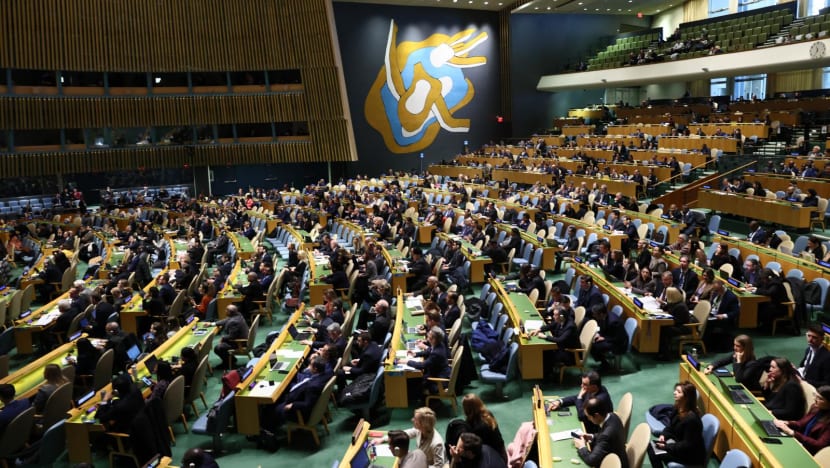
This allows Beijing to appear neutral, aligning with its longstanding public position on the conflict, Alexey Muraviev, an associate professor of national security and strategic studies at Curtin University, told CNA.
Describing this approach as “smart”, Muraviev highlighted that Beijing also avoids being seen as taking a stance against Russia, a key strategic partner.
China and Russia’s economic ties have deepened, with official statistics showing that bilateral trade hit a record US$240 billion in 2023 - a near 64 per cent surge from 2020.
This was driven by soaring energy exports from Moscow to Beijing. Russia supplies over 2 million barrels of oil per day, overtaking Saudi Arabia as China’s top crude oil provider, while Beijing sends vital machinery and electronics, reflecting their strategic economic interdependence.
On Monday, the same day as the UNGA vote and the third anniversary of the Ukraine war, Chinese President Xi Jinping praised Beijing’s close ties with Moscow in a call with Russian President Vladimir Putin.
He said "history and reality" demonstrate the two nations are “good neighbours that cannot be moved away, and true friends who share weal and woe, support each other and achieve common development,” reported Chinese state news agency Xinhua.
Xi also commended Moscow's "positive efforts to defuse" the Ukraine crisis, Xinhua reported.
Related:
At the same time, Muraviev asserted that China’s abstention ultimately serves in Russia’s favour.
“Abstaining (from voting) is essentially a vote wasted in favour of either side … China recognises its significant economic interests in Western Europe and the US and is cautious about being drawn into the political dynamics of this ongoing conflict. At the same time, it does not want to upset Russia,” he explained.
“By abstaining, China leaves room for interpretation, but in effect, its position implicitly supports Russia.”
Arguing otherwise, Reyes from HKU noted that despite the strong rhetoric, China’s stance does not necessarily equate to backing Russia at the UN, where complex diplomatic calculations are at play.
“There's what you say and what you do … China has its own interests, and they don't necessarily coincide completely with Russia's interests. The idea that they should be in lockstep, I think, is a kind of figment of the imagination of folks in Washington DC,” he said.
A CHANGING WORLD ORDER
Analysts say China’s abstention also has to be seen in the context of a changing world order, particularly one where the US under Trump’s leadership is upending its long-held role as a leading global player.
The US opposed the Ukraine-sponsored resolution in a striking reversal, siding with Russia and placing it in the same camp as countries like Belarus and North Korea.
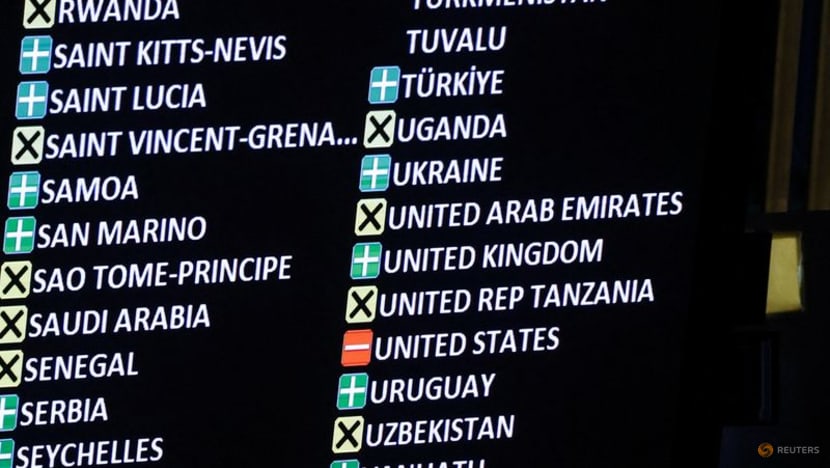
Washington also abstained on its own resolution after Europe pushed through amendments to include references to Moscow’s full-scale invasion and Ukraine’s sovereignty and territorial integrity.
The US ended up pushing its original draft to a UN Security Council (UNSC) vote, which is binding. It passed 10-0 with five abstaining - Denmark, France, Greece, Slovenia and the United Kingdom.
“The US is now aligned with Russia in the (Ukraine-backed) resolution … damaging its own credibility with Europe and its other partners and allies,” said Reyes from HKU.
Beijing has refrained from condemning Russia’s actions in Ukraine, prompting some members of the North Atlantic Treaty Organization (NATO) to label it an "enabler" of the conflict. China has dismissed such accusations, insisting on its neutrality.
During the UNSC meeting on Ukraine on Feb 24, Fu Cong, China’s permanent representative to the UN, reaffirmed Beijing’s stance, calling on all parties to “participate in peace talks” and reach a “binding peace agreement acceptable to all parties concerned”.
China’s stance is essentially a call for all parties to uphold international law, Reyes asserted, describing it as the “correct strategy” at a time when the US has been undermining its global credibility by casting doubt on international institutions and withdrawing from UN bodies such as the World Health Organization and the UN Human Rights Council.
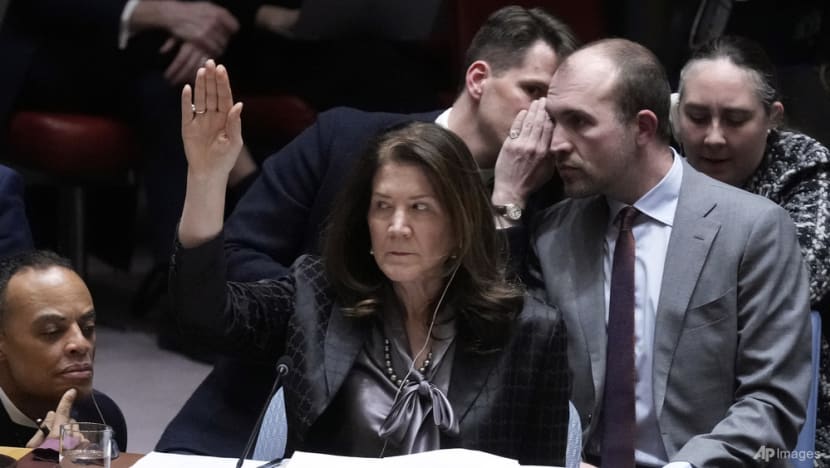
“(China) is probably thinking, we don’t want to be seen as siding with Putin … (and) openly going against international law. So it is saying: ‘We're the grown-ups. Let’s take it through the proper channels.’ And I think that's a very subtle message,” he said.
Experts say China is also wary about the optics.
“The Chinese are not just thinking about their relationship with Moscow or their relationship with Washington. They also want to be careful about how other countries, especially those in the Indo-Pacific and Global South, receive China, and abstaining helps it (achieve) that,” said Muraviev from Curtin University.
VOTING PATTERNS: MORE THAN MEETS THE EYE?
The Ukraine-backed resolution passed with 93 votes in favour, 18 against and 65 abstentions - underscoring a significant erosion in international support for Ukraine and in diplomatic condemnation of Moscow.
A similar vote in 2022 when the war first broke out saw 141 countries voting in favour, with only five against and 35 abstaining.
The steep drop in affirmative votes reflects growing divisions over the war, as well as shifting geopolitical calculations among UN member states, noted Reyes.
He further pointed out that some voting shifts appear directly linked to Washington’s change in stance from support to opposition.
This includes the US’ three freely associated states in the Pacific - the Marshall Islands, Micronesia, and Palau. Having voted in favour of the 2022 vote, this time they switched to abstaining or outright opposition.
The Trump administration, inaugurated in January, has repeatedly criticised Ukraine - accusing Ukrainian President Volodymyr Zelenskyy of starting the war with Russia and labelling him a “dictator”. Trump has also pushed for peace negotiations with Moscow, with the initial meeting excluding Kyiv.
Observers also highlighted the pronounced increase in abstentions.
Several countries in South and Central America, including Argentina, Brazil, the Dominican Republic, and Honduras, as well as African nations such as Ethiopia, Malawi, Rwanda, and Zambia, all shifted their stance from supporting the 2022 resolution to abstaining in the latest vote.
.png?itok=ehXzfPwi)
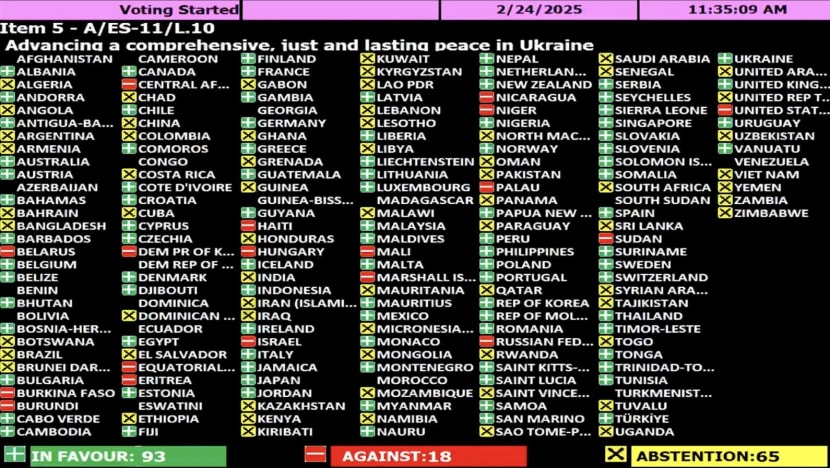
Similarly, several Middle Eastern nations, including Oman, Saudi Arabia, and Yemen, along with Brunei in Southeast Asia, moved from support to abstention.
While each country’s decision to abstain is influenced by its own unique considerations, the marked increase aligns with China’s apparent position. Analysts view this as a subtle diplomatic win for Beijing, especially with the global leadership of the US in question.
Europe and other US partners and allies “are now looking around for a country (to follow), and there's China,” said HKU’s Reyes.
AVOIDING THE SPOTLIGHT
That being said, analysts believe China is trying to keep a low profile on the global stage - at least for now - as it contends with a Trump 2.0 presidency and a raft of domestic challenges.
Reyes suggests that behind-the-scenes negotiations between the world’s two largest economies are ongoing, with stakes potentially higher than publicly known. At this stage, he argues, China has little reason to openly challenge the US, as doing so could put any potential deal at risk.
Trump imposed across-the-board 10 per cent US tariffs on Chinese goods in early February, prompting Beijing to strike back with retaliatory duties and file a complaint with the World Trade Organization.
The US president upped the ante this week, threatening an extra 10 per cent levy on Chinese imports.
“On the trade front, a deal is still possible, especially since the US has yet to impose the 60 per cent tariffs it previously threatened on Chinese products,” Reyes said.
“Even on Taiwan, an agreement could emerge - the island itself could be a bargaining chip, for all we know. These days, you have to consider the unthinkable.”
With China’s annual two sessions - the concurrent meetings of its legislature and top political advisory body - set to begin on Mar 4, Reyes believes Beijing is all the more keen to avoid unnecessary distractions at this critical juncture.
“It serves as Xi Jinping’s mid-term report card in his third term as China’s top leader. With recent engagements with the private sector and policy announcements aimed at boosting economic confidence, Beijing appears determined to turn the corner.
“(China) wants to keep its focus firmly on economic priorities and avoid the perception of overextending itself on distant international issues,” he added.
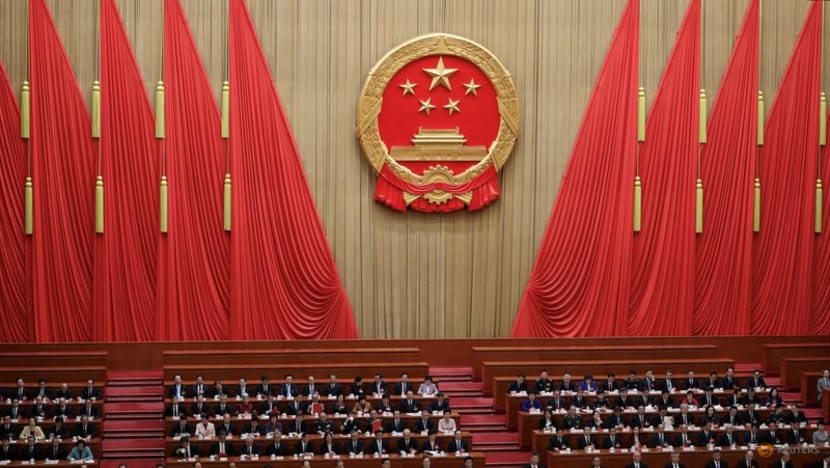
China reaffirmed its commitment to the UN in February when it assumed the rotating presidency of the UNSC that month. Addressing a high-level UNSC meeting in New York, Foreign Minister Wang Yi advocated for multilateralism as a means to resolve conflicts.
Building on this, calls have emerged from various quarters for China to take a more prominent role in leading global efforts to champion multilateralism, noted analysts.
However, Muraviev from Curtin University cautioned that the timing may not be right for such a shift. He argued that while China’s rhetoric on multilateralism is evident, it does not necessarily guarantee concrete actions on the global stage.
“China still lacks diplomatic maturity,” he asserted, noting that while the country “clearly has global ambitions to expand its influence”, it remains hesitant to take a decisive leadership role.
Observers say another concern for Beijing is that as US spending tightens, pressure on China - as the world’s second-largest economy - to contribute more is likely to grow.
China now funds 20 per cent of the UN’s regular budget, nearing Washington’s 22 percent share, the South China Morning Post reported on Feb 22.
However, the US far outspends China on specialised UN agencies. Last year, it contributed US$4.5 billion to the World Food Programme - more than 400 times China’s US$11 million, a sum comparable to that of Burundi, a small east African nation.
Muraviev believes that while China aspires to be a leader in global multilateralism, this is a long-term goal rather than an immediate priority, as such influence takes time to build.
"China has long been seen as a rising superpower, and with that status comes the need to gain experience as one of the world’s major powers - there is no alternative," he said.
"Being a global power isn’t just about economic or military strength; it requires offering an ideology, a vision, or acting as a missionary of sorts. That takes time to develop. But for now, China knows that domestic issues come first."















